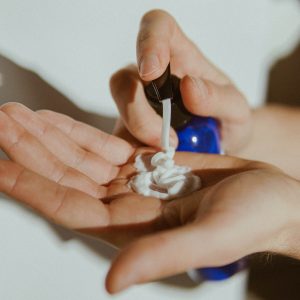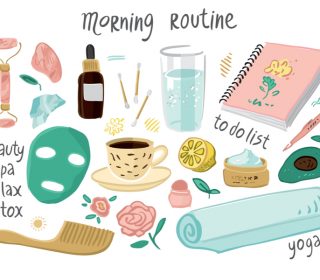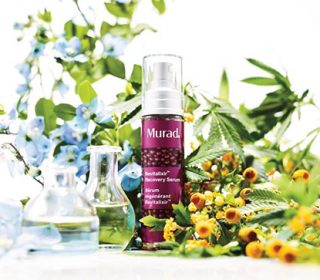5 skincare tips for a glowing complexion

There’s a lot of conflicting advice on how we should be caring for our skin day-to-day. Consultant dermatologist Dr Anjali Mahto shares her top skincare tips for a glowing complexion and debunks common skincare myths.
KEEP IT CLEAN
If using a foam-based wash or cleansing gel, the product should be applied with your fingertips directly to damp skin. This should be done for as long as it takes to generate lather and target all areas of facial skin.
Consider double-cleansing. This removes sweat, bacteria and old skin cells, as usual, then a second round of cleansing will clean much deeper into the pores to remove any impurities. While there are no rigorous scientific trials that show the anti-ageing benefits of double cleansing, there is plenty of evidence that suggests pollution and environmental toxins can accelerate the ageing process.
Taking at least a minute to do a water-based cleanse will ensure you gain all the benefits from your cleanser and its ingredients. On average, most people only spend about twenty seconds on cleansing, which isn’t enough time to massage the cleanser in properly.
We need to be sensible about cleansing, as over-washing can lead to dryness, sensitivity and irritation – rather than a glowing complexion. The ideal cleanser should be sulphate-free to avoid stripping the skin of its natural oils, and it’s important not to rub the skin too harshly.
TREAT AND PROTECT

Always wearing an SPF, ideally of at least factor 30, is a simple step to take to get that glowing complexion, as it is key for protecting against UV rays. Ultraviolet is a key culprit in ageing skin and one of the primary reasons skin loses its elasticity.
Secondly, invest in antioxidant serums that include ingredients such as vitamin C, vitamin E, ferulic acid, resveratrol that can limit free radical damage caused by UV light but also improve sunscreen action.
Thirdly, use a night-time retinoid product. Retinoids have been shown in trials to improve collagen production and reduce pigmentation over time. I am sceptical of products that claim to lift and tighten skin that has already started to sag. There is little scientific evidence that firming products have any profound, lasting effects on the skin.
There are skin tightening treatments that you can get done by a professional such as radio-frequency and ultrasound devices. Both methods are thought to promote collagen production over time resulting in a reduction of skin laxity. These treatments are reasonably low key and have a short recovery time, however, multiple treatments are usually necessary and there can be temporary redness, swelling or numbness following a procedure. As always, talk to a professional before undertaking any kind of new treatment.
STAY HYDRATED
Dark circles have a number of causes but using brightening agents around the eye such as vitamin C, as well as peptides and caffeine may help to a limited degree, and get you that bit closer to achieving a dewy, glowing complexion. If, however, the dark circles are due to a loss of facial fat underneath the eye, then no amount of topical eye cream will reduce the appearance of the shadow which may develop. This is because treatments are unable to penetrate deep enough into the skin.
Keep fully hydrated, particularly during the warmer months or if you are suffering from sunburn. The skin also loses more water content as we sleep which can be a problem for normal or dry skin types. Always ensure you moisturise before bed as this is when your skin needs its extra moisture. Drinking a lot of water will not help with fine lines and wrinkles, however – a common myth that often gets thrown about.
FINESSE YOUR ROUTINE
Using multiple layers of products is not necessary for everyone seeking out that glowing complexion. It may be helpful in those with extremely dry skin, but it’s important to bear in mind that the more products that are used, the higher the chance of developing irritation or potentially even acne in susceptible skin types.
Your skincare routine should reflect your skin type. Cleanse twice a day with a cream cleanser or micellar water, and exfoliate to remove the upper layer of dead skin cells – this improves the skin’s texture, age spots and uneven skin tone which ultimately allows for better penetration of skincare products such as moisturisers or serums. Facial toners also have a number of positive roles in skincare – they can remove excess oils and makeup and balance the pH of your skin. Toners are useful for those with very oily or acne-prone skin. They should be applied to a cotton pad and wiped over the skin surface. Serums contain high concentrations of active ingredients and should be used before moisturisers. They are fast-acting and lightweight. A few drops is plenty and applying to damp skin may increase their penetration – because damp skin is more permeable to products.
DON’T FORGET THE NECK
The skin on the neck is much thinner than the skin on the face, so it loses elasticity and is one of the most noticeable signs of ageing. The neck has less of a support structure than the face, which leaves it prone to wrinkles, sagging and uneven skin tone. Many people still neglect the neck area, despite having a thorough skin care regime for their face, so treat them as one unit.
Despite there being numerous neck creams on the market, there’s no singular, quick-fix, anti-ageing ingredient specifically for this area. Just invest in high-quality face products and incorporate your neck into your daily skincare routine.
Dr Anjali Mahto (MBBCh BSc MRCP (Derm)) is a renowned London trained consultant dermatologist and best-selling author of The Skincare Bible.
As one of the UK’s leading dermatologists, Dr Mahto understands beauty products and is passionate about sharing her knowledge and debunking myths about the latest fads and miracle products and cures. Her work bridges the gap between traditional medical dermatology, beauty and cosmetic medicine. Her mission is to make trusted and reliable skin information accessible alongside improving science literacy and responsible influencing.










